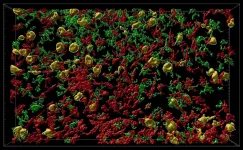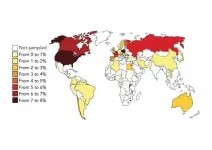Muscle cramp? Drink electrolytes, not water
New research from Edith Cowan University has revealed drinking electrolytes instead of pure water can help prevent muscle cramps.
2021-03-18
(Press-News.org) If you reach for water when a muscle cramp strikes, you might want to think again. New research from Edith Cowan University (ECU) has revealed drinking electrolytes instead of pure water can help prevent muscle cramps.
The study, published in the Journal of the International Society of Sports Nutrition, found that people who drank electrolyte enhanced water during and after exercise were less susceptible to muscle cramps than those who drank pure water.
Muscle cramps are a common painful condition affecting many people, including around 39 per cent of marathon runners, 52 per cent of rugby players and 60 per cent of cyclists.
Dilution solution
Lead researcher Professor Ken Nosaka, from ECU's School of Medical and Health Sciences, said the study builds on the evidence that a lack of electrolytes contributes to muscle cramps, not dehydration.
"Many people think dehydration causes muscle cramps and will drink pure water while exercising to prevent cramping," he said.
"We found that people who solely drink plain water before and after exercise could in fact be making them more prone to cramps.
"This is likely because pure water dilutes the electrolyte concentration in our bodies and doesn't replace what is lost during sweating."
When cramp strikes
Professor Nosaka began researching the causes of muscle cramps after regularly suffering from them while playing tennis.
The study involved 10 men who ran on a downhill treadmill in a hot (35ºC) room for 40 to 60 minutes to lose 1.5 to 2 per cent of their body weight through sweat in two conditions.
They drank plain water during and after exercise for one condition and took a water solution containing electrolytes in the other condition.
The participants were given an electrical stimulation on their calves to induce muscle cramp. The lower the frequency of the electrical stimulation required, the more the participant is prone to muscle cramp.
"We found that the electrical frequency required to induce cramp increased when people drank the electrolyte water, but decreased when they consumed plain water," said Professor Nosaka.
"This indicates that muscles become more prone to cramp by drinking plain water, but more immune to muscle cramp by drinking the electrolyte water."
Not all water is equal
Electrolytes are minerals including sodium, potassium, magnesium and chloride. They are essential for muscle health and help the body to absorb water.
Oral rehydration solutions contain electrolytes in specific proportions and can be made with water, salt and sugar. They are commonly found in supermarkets and pharmacies.
Professor Nosaka said electrolytes have many benefits for both athletes and the general population.
"Electrolytes are vital to good health - they help the body to absorb water more effectively than plain water and replace essential minerals lost through sweat or illness," he said.
"People should consider drinking oral rehydration fluids instead of plain water during moderate to intense exercise, when it's very hot or when you are sick from diarrhoea or vomiting."
Professor Nosaka is planning further research to find out the optimal amount of electrolytes to prevent muscle cramps as well as how they could help the elderly and pregnant women.
INFORMATION:
'Effect of oral rehydration solution versus spring water intake during exercise in the heat on muscle cramp susceptibility of young men' was published in the Journal of the International Society of Sports Nutrition.
[Attachments] See images for this press release:

ELSE PRESS RELEASES FROM THIS DATE:
2021-03-18
Scientists are learning that a lesser-studied region on the pandemic coronavirus is recognized by COVID-19 infection-fighting antibodies. These antibodies were identified in blood samples from previously infected patients, and were found to potently prevent the virus from infecting cells.
The coronavirus spike protein is the key that unlocks the door to the cell, and antibodies bind to the spike protein to jam this function. Much attention has been given to studying antibodies that target the receptor-binding domain on the coronavirus spike protein. (The receptor-binding domain of the spike is responsible for triggering the merging of the ...
2021-03-18
Anemia, a condition characterized by the lack of healthy red blood cells in the body, is common in patients with chronic kidney disease who need to undergo routine hemodialysis (a process that helps to "clean" the blood when the kidneys don't function well). Thus, red blood cell-stimulating agents (called "erythropoiesis-stimulating agents" or ESAs) and iron supplements (ISs) are administered as part of this process. But, complications can arise if the patients have an altered iron metabolism or poor response to medications. Moreover, the medications tend to be expensive and impose a heavy financial burden on public health. Thus, with such patients currently ...
2021-03-18
Malting, the processing of cereal grains into malt, generates rootlets as a side-stream product, which is currently mostly utilised as animal feed. However, this leftover material has not only a high protein content, but also high amounts of phytochemicals, which makes it a highly potential source of development for the food industry, according to a recent study from the University of Eastern Finland, published in npj Science of Food.
Germination increased the amount of phytochemicals
The study utilised metabolomics to analyse samples from grains of four cereals typically used in malting: barley, rye, wheat, and oats. The researchers were particularly interested in phytochemicals, which are bioactive compounds ...
2021-03-18
Leesburg, VA, March 18, 2021--According to ARRS' American Journal of Roentgenology (AJR), contrast-enhanced mammography (CEM) showed concordance with MRI in women with newly diagnosed breast cancer and breast augmentation.
Noting that CEM has not been investigated in women with breast augmentation, Molly Carnahan and her Mayo Clinic team in Phoenix, AZ, concluded, "the findings suggest a possible role of CEM for staging in women with breast augmentation and contraindication or limited access to MRI."
From an institutional database of 2,215 women who underwent ...
2021-03-18
The immense diversity in the living world and how it came into being has always been a subject of human enquiry. After centuries of playing detective in search of the basis of the parities and disparities that we see among living beings around us, the past century stood witness to some marvellous discoveries in biology and today the Central Dogma of life has been disclosed to us: DNA makes RNA and RNA makes protein (a facile view of a much more complex sequence of events). Together with contributing environmental factors, proteome(s) (total protein content of a cell) collectively influence 'traits' or characteristics of organisms that vary among individuals of a population. In a population, individuals with traits better suited to their environment have a higher chance at survival ...
2021-03-18
BIRMINGHAM, Ala. - The triggers and causes of a severe scarring disease of the lungs -- idiopathic pulmonary fibrosis, or IPF -- remain unclear.
Now research published in Science Translational Medicine shows how cadmium and carbon black can trigger lung macrophages to produce a modified protein, citrullinated vimentin, or cit vim, which leads to lung fibrosis. Researchers from the University of Alabama at Birmingham and three other American universities also describe a sequence of mechanistic steps in lung macrophages and lung fibroblasts that leads to the lung scarring.
One of the enzymes involved in these steps -- peptidylarginine deiminase 2, or PAD2 -- may be a promising target to attenuate cadmium/carbon black-induced ...
2021-03-18
March 18, 2021 -- A study conducted at Columbia University Mailman School of Public Health reports a high global prevalence of both depression and anxiety during the COVID-19 pandemic and shows how implementation of mitigation strategies including public transportation and school closures, and stay-at-home orders impacted such disorders. The results are published in Psychological Medicine.
"Our research found an elevated global prevalence of these mental health issues during COVID-19 and also revealed there was a wide variance in each at the region- and country-level," said, João Castaldelli-Maia, MD, PhD, NIDA-INVEST Postdoctoral Fellow in the Department of Epidemiology, and ...
2021-03-18
Our knowledge of Alzheimer's disease has grown rapidly in the past few decades but it has proven difficult to translate fundamental discoveries about the disease into new treatments. Now researchers at the California National Primate Research Center at the University of California, Davis, have developed a model of the early stages of Alzheimer's disease in rhesus macaques. The macaque model, published March 18 in the journal Alzheimer's & Dementia: The Journal of the Alzheimer's Association could allow better testing of new treatments.
The model was developed by Professor John Morrison's laboratory ...
2021-03-18
IN BRIEF:
It's a first: approximately 100 scientists in 42 countries joined forces to learn about the incidence of parental burnout.
They found that Western countries are the most affected by parental burnout.
The cause? The often individualistic culture of Western countries. This international study, published in Affective Science, shows how culture, rather than socio-economic factors, plays a predominant role in parental burnout.
The individualism is more pronounced during health crises.
Does the incidence of parental burnout depend on a country's culture? This question was at the heart of the first international study on the subject for which hundreds of scientists in 42 countries mobilised. In other words, the global scientific ...
2021-03-18
The results, published in the renowned scientific journal The Cryosphere, have made it possible to reliably describe snow trends at up to 2000 metres above sea level. Higher than that, there are too few measuring stations to be able to extract reliable information for the entire Alpine region. This consistent data set spans five decades and was created through the collaboration of more than 30 scientists from each of the Alpine states. The results and data collected represent a valuable aid for future studies, especially those which centre on climate change.
"This ...
LAST 30 PRESS RELEASES:
[Press-News.org] Muscle cramp? Drink electrolytes, not water
New research from Edith Cowan University has revealed drinking electrolytes instead of pure water can help prevent muscle cramps.









